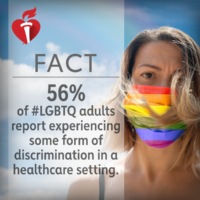 LGBT adults report experiencing high rates of discrimination in health care settings, according to a 2020 statement released by the American Heart Association. As part of National LGBT Health Awareness Week held March 22-26, 2021, the Association is highlighting the unique factors affecting LGBT health and reiterates the call for policy change within health care education and clinical settings to improve LGBT cardiovascular health.
LGBT adults report experiencing high rates of discrimination in health care settings, according to a 2020 statement released by the American Heart Association. As part of National LGBT Health Awareness Week held March 22-26, 2021, the Association is highlighting the unique factors affecting LGBT health and reiterates the call for policy change within health care education and clinical settings to improve LGBT cardiovascular health.
Challenges of the COVID-19 global pandemic have made the past year difficult for many, including those in the LGBT community. Isolation from family and friends can take an emotional toll, while unhealthy habits picked up while living in quarantine can take a physical one. So can skipping medications and medical exams, which is happening frequently as social distancing concerns led people to miss their routine check-ups and annual physicals.
But LGBTQ individuals have been delaying primary care and preventative visits long before the pandemic because there is a great fear of being treated differently. It’s important to find a trustworthy health care provider who understands and respects the unique emotional and physical health challenges many LGBT adults face. Ask friends and community members for recommendations and make an appointment now.
There are unique health care barriers for LGBT people:
- More than half (56%) of LGBT adults and 70% of those who are transgender or gender non-conforming report experiencing some form of discrimination from a health care professional.
- Fear of discrimination can translate to LGBT adults delaying primary or preventive care, or lack of trust toward health care professionals.
- LGBT adults experience multiple, interrelated psychological and social stressors, including exposure to discrimination and violence. While data on how these stressors affect their cardiovascular health is limited, there is evidence that mental health has direct effects on physical health, and stressors can contribute to increased inflammation, which impacts heart health.
- LGBT populations may face unique stressors, such as family rejection and anxiety over concealment of their sexual orientation or gender identity.
- LGBT adults in historically underrepresented racial or ethnic groups all experience higher poverty levels, insecure housing and fewer health care options than their white LGBT peers.
What can be done to improve health for LGBT people?
- Add LGBT-related content to health care professional training and licensure requirements.
- The Accreditation Review Commission on Education for the Physician Assistant began requiring LGBT curricular content in September 2020.
- Include sexual orientation and gender identity information in electronic health records to provide an opportunity to address specific health concerns for LGBT patients, and information that allows broader examination in research and public health efforts of the cardiovascular health of LGBT adults.